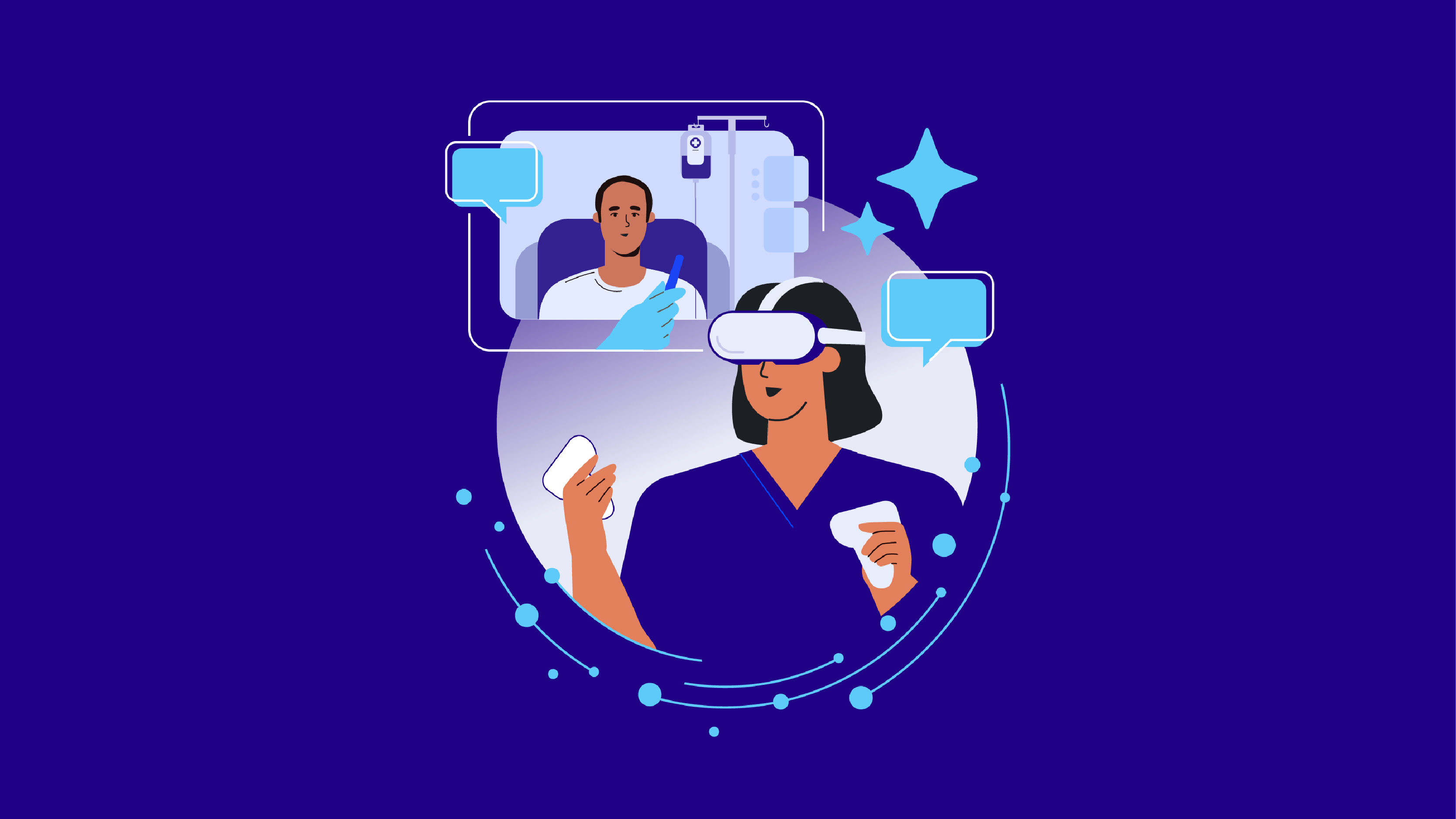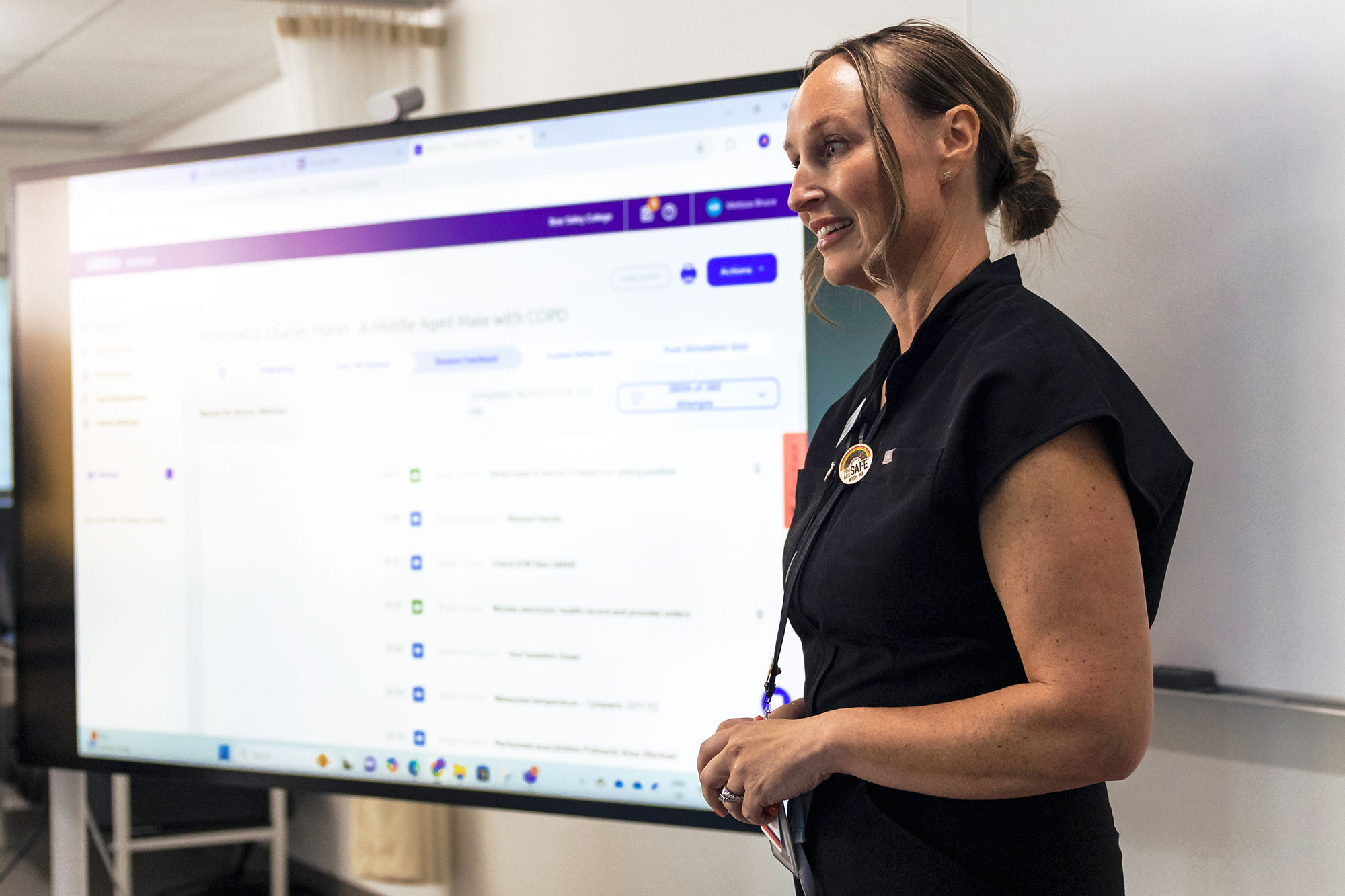UbiSim 1.14 Release: Alzheimer’s & Trans Patients, NG Tube, and Other Highly Requested Features

Table of Contents
Name of the heading
1- Start your table with the syntax {start-table}
2 - Add an H3 Heading to create a new column (this will be the column title)
3 - List cells as bullet points in a List element
4 - End your table with the syntax {end-table}
We are thrilled to announce the latest update to UbiSim (1.14), packed with new features and improvements designed to enrich the training experience for nursing students and professionals. Our focus remains on providing an immersive, realistic, and educationally valuable simulation environment that aligns with the latest standards in nursing education.
Many of these new scenarios, features, and improvements were widely requested. We’re so happy our team was able to bring them to life!
Here’s what’s new:
Exciting New Scenarios
UbiSim’s Lead Nurse Educator, Christine Vogel, MSN, RN, CHSE, CHSOS, shared, “UbiSim's catalog aims to foster cultural sensitivity and inclusivity within its scenarios. Our meticulously designed scenarios present a broad spectrum of patient profiles, encompassing a diverse array of cultural, ethnic, and socio-economic backgrounds. With a commitment to inclusivity, these scenarios are thoughtfully developed to avoid the inadvertent perpetuation of stereotypes or biases.”
Morgan Therin - Alzheimer’s Disease: Safe Medication Administration
Morgan is experiencing agitation and refusing care due to Alzheimer's disease. Learners administer medications, address environmental safety concerns, and provide therapeutic communication to assist Morgan in this fundamentals scenario.

Skylar Holmes - Acute Abdominal Pain:
Learners gather admission information and care for a male transgender patient, focusing on practicing therapeutic communication and delivering nursing care that is sensitive, respectful, and inclusive.

Highly Requested New Features
Nasogastric (NG) Tube
Active participants can now install a Nasogastric (NG) Tube on any patient and attach it to suction for decompression. UbiSim will be adding additional functionality to the NG Tube over time.
Installing the NG tube on the patient can be used as a condition for active participant feedback or a transition for patient state progression.
The NG Tube can be attached to suction. Learners can observe the color of aspirated stomach contents and receive further information about volume and texture via a pop-up. Performing suction can be used as a condition for feedback or patient state transition.
A 30 mL long-nosed syringe is now available to allow active participants to perform a pH check on stomach contents via the NG Tube. Checking the pH can also be set as a condition for feedback.

Suction Regulator Upgrade
We installed an additional bedside suction regulator and canister so that the NG tube and oral/nasal suction each have a dedicated suction regulator and canister on the headwall.
All regulators have been upgraded to include a new ‘intermittent’ suction setting. When selected, ‘intermittent’ suction administers cycles of 10 seconds on and 4 seconds off.
Intermittent suction can be set to a low, medium, or high strength by turning the vacuum knob.
Suction effects have been added to the free end of the suction tube to give a visual indication of when suction is on.

Call light adjustment
An important nursing intervention for learners is to ensure that the patient’s call light is within reach when the nurse is done caring for the patient.
As such, we have created a new call light condition functionality that captures if the learner places the call light within the patient’s reach at the end of the patient care encounter. This can be used for learner feedback in debriefing activities.

Helpful Fixes & Improvements
- We have refactored our system of how to handle objects that are dropped in a scenario (ie: the active participant lets go of the object they are holding either by choice or accident). Objects dropped into thin air now fall and behave more consistently, allowing a more intuitive and predictable experience for active participants.
- Our infant patient has received several updates based on user feedback to improve the fidelity of in-scenario experiencessome text
- The volume of the baby’s crying has been adjusted to be slightly quieter. Feedback from our client base suggested that the baby’s crying was unexpectedly loud compared to other room sounds.
- Baby’s blinking speed and eye movement when they are in the lethargic state have been slowed down and adjusted to a more realistic speed.
- Baby’s ‘on-belly’ animations and position have been adjusted to avoid immersion-breaking glitches where their face is buried in the bed.
- All patients can now be set to exhibit any audible respiratory sound alongside appearing short of breath. This allows scenario creators and editor to fine tune patient presentation of respiratory symptoms for higher fidelity experiences.

- We repositioned the upside-down swab that a clumsy product person knocked over while working in the hospital room. Sorry about that. It’s the right way up now!

- All scenarios are peer-reviewed annually and align with the Next Generation NCLEX, NCSBN Clinical Judgment Measurement Model, and the AACN Essentials: Core Competencies for Professional Nursing Education.
Final Thoughts
We are excited for you to experience these new features and improvements! Whether you are training on fundamental skills with Morgan Therin or advancing your communication techniques with Skylar Holmes, UbiSim is here to support your educational journey in the most realistic and engaging way possible.
Stay tuned for more updates as we continue to innovate and push the boundaries of nursing education technology. Thank you for choosing UbiSim!
FAQs
Heading 1
Heading 2
Heading 3
Heading 4
Heading 5
Heading 6
Lorem ipsum dolor sit amet, consectetur adipiscing elit, sed do eiusmod tempor incididunt ut labore et dolore magna aliqua. Ut enim ad minim veniam, quis nostrud exercitation ullamco laboris nisi ut aliquip ex ea commodo consequat. Duis aute irure dolor in reprehenderit in voluptate velit esse cillum dolore eu fugiat nulla pariatur.
Block quote
Ordered list
- Item 1
- Item 2
- Item 3
Unordered list
- Item A
- Item B
- Item C
Bold text
Emphasis
Superscript
Subscript
Explore more

Why Q1 Decisions Determine Your Nursing Workforce Pipeline
Why January–March decisions shape nursing workforce capacity, readiness, and retention, and how early action strengthens the pipeline.

From 30 Minutes to 3: How AI Enhanced Analytics Transforms Debriefing Preparation
AI Enhanced Analytics: Scenario Performance Data now available in UbiSim's Version 1.19
.jpg)
Behind the Scenes: How We Brought Incisions & Dressings to Life in VR
How the UbiSim team built a VR system displaying 300+ distinct incision states—balancing clinical accuracy, technical constraints, and nursing education needs.



